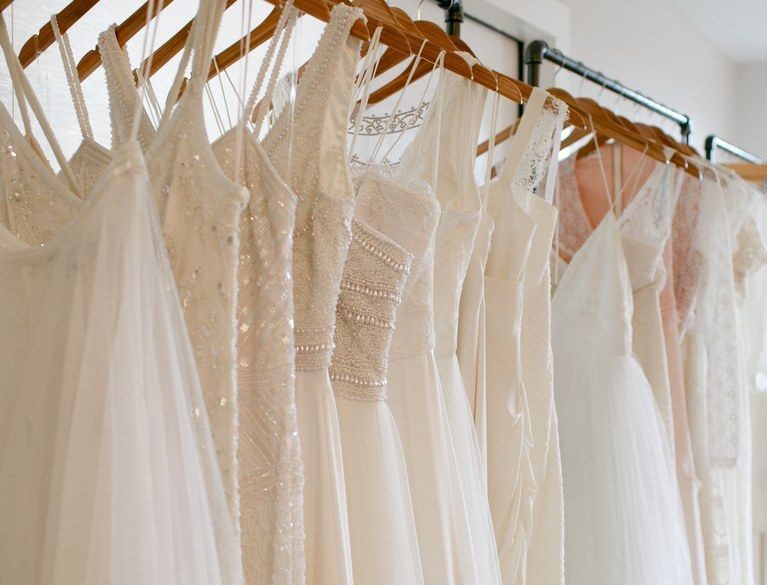Why Prices for Wedding Dress Preservation Can Vary So Much
 Just like dry cleaning, wedding dress preservation does not come with the same price every time. You could walk into one shop and get a quote for $300, then head across town and hear $950 for what sounds like the same exact service. And in that moment, it’s hard not to wonder: why the huge gap?
Just like dry cleaning, wedding dress preservation does not come with the same price every time. You could walk into one shop and get a quote for $300, then head across town and hear $950 for what sounds like the same exact service. And in that moment, it’s hard not to wonder: why the huge gap?
The difference in cost is rarely about someone just charging more for the sake of it. It's often about the quality of preservation you receive in return. So, what’s really included in that final price you were quoted? Let’s find out in this post.
1 | Type of fabric and embellishments
(Can Add $100–$300 to Your Base Cost)
One of the first things that affects the cost of wedding dress preservation is the fabric from which your dress is made and the extra detailing it carries. Not every material handles cleaning or long-term storage the same way.
Natural fabrics like silk or delicate lace need far gentler care than a sturdy polyester. Add in hand-sewn beads, sequins, or embroidery, and suddenly it takes a lot more work—and skill—to keep your dress looking flawless. That extra time and caution are exactly why prices rise.
Why Special Handling Drives Up the Price
To give you a better idea of why costs jump, let’s break down how specific elements impact the process.
| Material or Embellishment | Why It Affects Cost | Impact on Preservation |
|---|---|---|
| Silk | Requires specialty, low-moisture solvents | Easily watermarked and prone to yellowing; takes more time and care |
| Lace and Tulle | Fragile, easily snagged or distorted | Often handcleaned to avoid damage, increasing labor time |
| Beads and Sequins | Can melt, bleed, or lose shine during standard cleaning | Must be tested and sometimes cleaned around individually |
| Embroidery | Threads can unravel or fade | Needs gentle surface cleaning to preserve detail and color |
| Layered Fabrics | Add bulk and complexity | More fabric to fold, stuff, and protect properly in the preservation box |
2 | Amount and severity of stains
(Adds $75–$200 Depending on Stain Depth)
The next big price driver is simply how dirty your wedding dress is. Outdoor ceremonies, dance floor mishaps, bustling through city streets—each adds potential grime and hidden stains. Even if your dress looks pretty clean on the surface, sweat, oils, or sugar from cake can set into the fibers and show up months later as yellow spots.
The more work it takes to remove those stains without damaging the fabric, the more the preservation will cost. Waiting too long after the wedding also makes stains harder (and pricier) to remove.
What Cleaners Watch for When Assessing Stains
Before quoting your preservation cost, a professional will carefully inspect your dress to figure out just how extensive the treatment needs to be.
| Stain Area/Type | Why It Matters | Added Labor/Cost Factors |
|---|---|---|
| Grime along hems and trains | Hems often collect dirt, mud, grass, and pavement residue | Multiple gentle spot treatments are usually required to lift debris |
| Makeup, wine, and oil stains | Common on bodices or straps—these stains can seep deep into fabric | Require careful pretreatment to break down fats, dyes, or pigments |
| Oxidized sugar stains | Invisible at first, these can darken over time and become very difficult to treat | Need special solutions and attention—especially if left untreated |
3 | Complexity of the dress design
(Adds $75–$150 for Intricate Designs)
Not every wedding dress is simple to clean and preserve. Some have dramatic architecture, such as built-in corsets, layered crinolines, intricate overlays, or detachable elements like capes and sleeves.
Each of these design elements adds steps to both the cleaning and preservation process. The more intricate the construction of your dress, the more hands-on work is needed to protect its shape and style for years to come.
How Complex Designs Influence Preservation
Preserving these elaborate styles involves more than just extra cleaning. Professionals must think ahead to how the dress will sit for decades.
| Design Feature | Preservation Challenge | Why It Costs More |
|---|---|---|
| Structured bodices and boning | Can’t be folded like simpler styles; they require internal supports | Require additional labor and custom packing materials |
| Layered trains or overskirts | Must be layered with acid-free tissue paper to prevent creasing | Time-intensive folding and positioning |
| Detachable elements | Cleaned and packed individually with protective barriers | More handling and separate packaging steps |
4 | Quality of the preservation materials
(Adds $100–$200 Over a Basic Cardboard Box)
What your dress is packed into matters just as much as how it’s cleaned. A lower-priced service may use a basic cardboard box and standard tissue paper, but those materials can introduce acids over time, causing yellowing, brittleness, and irreversible fabric damage.
Higher-end services, on the other hand, use acid-free, pH-neutral boxes and lignin-free tissue paper that are specifically made for long-term textile preservation. While the initial cost may be higher, the investment means your dress stays beautiful and intact for decades, not just a few years.
Why Packaging Can Greatly Affect Cost
This is where your money truly buys you long-term security for your dress.
| Feature | Description | How It Impacts Price |
|---|---|---|
| Acid-free, Lignin-free Materials | Prevent yellowing, brittleness, and chemical breakdown over time | More costly to manufacture and source, they add to your quote |
| Window Boxes and Resealable Designs | Let you view or safely reopen your dress without exposing it to air or contaminants | Increase production complexity and material cost |
| Internal Structural Supports | Include padded bust inserts, shoulder forms, and layered folds with archival tissue to maintain the shape of your dress | Add to labor, time, and materials, raising the overall cost |
5 | Experience and reputation of the cleaner
(Adds $100–$300 for Top-tier Preservation Services)
Who you trust with your wedding dress has a big impact on what you’ll pay—and what you’ll receive in return. A high-end preservation boutique that specializes in bridal dresses will usually charge more than your neighborhood dry cleaner, but there’s a good reason for that.
Experienced preservationists have handled everything from delicate vintage lace to modern silk organza. They’ve seen tough stains, complicated dress structures, and high-end fabrics that require expert-level care. That experience often comes with added benefits: insurance coverage, long-term guarantees, and a proven track record of happy brides.
How Premium Services Compare to Standard Options
This is why the extra investment is often worth it, especially for designer or deeply sentimental dresses.
| Feature | Standard Cleaner | Premium Preservation Specialist |
|---|---|---|
| Experience Level | General dry cleaning knowledge | Trained in wedding dress preservation |
| Fabric Handling | May cause damage to delicate materials | Expert in silk, lace, and beaded dresses |
| Guarantees | Rarely included | Often includes lifetime or extended guarantees |
| Insurance Coverage | Not typically offered | Frequently provides insured protection |
| Customer Service | Basic intake and pickup | Personalized consultations, detailed inspections |
| Price Range | Lower ($200–$400) | Higher ($500–$900+) |

Seal Your “Happily Ever After” in a Box—Preserve Your Wedding Dress with Arrowhead Cleaners & Laundry Today!
Getting confused about wedding dress preservation prices is normal. What’s not normal is paying a premium and still worrying if your dress is truly protected. At Arrowhead Cleaners & Laundry, we combine decades of garment expertise with museum-level preservation techniques, so your dress is protected against yellowing, weakened fibers, and hidden threats like mold or pests.
From timeless ball gowns to sleek sheath silhouettes, from vintage heirlooms to bold non-traditional styles, we’ve seen it all, and we’ve preserved it all. Want convenience? We even offer Pickup and Delivery Service to make the process effortless.
Call Arrowhead Cleaners & Laundry at 701-599-4067 to schedule your Wedding Dress Cleaning and Preservation Service today!

